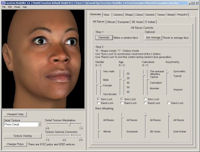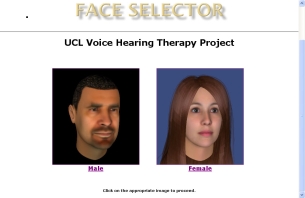Avatar Therapy Project
Julian Leff,
Mark Huckvale,
Geoff Williams
Funded 2012-2015 by the Wellcome Trust
Further development and clinical trial testing of a computer-assisted system to reduce auditory hallucinations ("Hearing voices")
Introduction
 Auditory hallucinations are an enduring problem in the treatment of serious mental illness such as
schizophrenia. About 25% of people with this diagnosis continue to experience persecutory hallucinations and delusions despite treatment with antipsychotic medication (Kane, 1996). Their capacity to work and make relationships is grossly impaired, often for the rest of their life. We have developed and evaluated a novel therapy based on computer technology which enables each patient to create an avatar of the entity (human or non-human) that they believe is talking to them. The therapist promotes a dialogue between the patient and the avatar in which the avatar progressively comes under the patient’s control. The project will refine the system, streamline the technology to make it more user-friendly and evaluate the system by a randomised controlled trial conducted by an independent team of researchers. It builds on prior work outlined here. Auditory hallucinations are an enduring problem in the treatment of serious mental illness such as
schizophrenia. About 25% of people with this diagnosis continue to experience persecutory hallucinations and delusions despite treatment with antipsychotic medication (Kane, 1996). Their capacity to work and make relationships is grossly impaired, often for the rest of their life. We have developed and evaluated a novel therapy based on computer technology which enables each patient to create an avatar of the entity (human or non-human) that they believe is talking to them. The therapist promotes a dialogue between the patient and the avatar in which the avatar progressively comes under the patient’s control. The project will refine the system, streamline the technology to make it more user-friendly and evaluate the system by a randomised controlled trial conducted by an independent team of researchers. It builds on prior work outlined here.
Aims
- To develop a computer-based technology that will help the clinician to treat more effectively the auditory hallucinations of schizophrenia and manic-depressive psychosis.
- To evaluate this technology in a randomised controlled trial.
Method
 |
The methodology is designed to tackle the problem created by the inaccessibility of the patients'
experience of
voices to the clinician. Patients troubled by persistent distressing voice are invited to
create an external representation of their dominant voice using computer technology.
Graphics software is used (specifically the FaceGen program, shown left) to create an avatar that will give a face to the voice, while
voice morphing software will realise it in sound.
We then use speech recognition and animation software supplied by Annosoft to cause the avatar to
respond to the patient's speech, creating a dialogue in which the voice
progressively comes under the patient's control.
|
Face Selection
| Try out the face selection tool by clicking on the image to the right. All face models shown are 2D images of 3D faces created within Facegen.
|  |
Publications
- Leff, J., Williams, G., Huckvale, M., Arbuthnot, M., & Leff, A. P. (n.d.). Silencing voices: a proof-of-concept study of computer-assisted therapy for medication-resistant auditory hallucinations. British Journal of Psychiatry (in press).
- Leff, J., Williams, G., Huckvale, M., Arbuthnot, M., & Leff, A. P. Avatar Therapy for persecutory auditory hallucinations: What is it and how does it work? Psychosis (accepted for publication)
- Huckvale M., Leff, J., Williams, G. Avatar Therapy: an audio-visual dialogue system for treating auditory hallucinations. Poster presentation at Interspeech 2013, Lyon, France. [pdf]
References
- Barbato, A. (1998) Schizophrenia and Public Health. Geneva: World Health Organization.
- Drury, V., Birchwood, M., Cochrane, R. & Macmillan, F. (1996) Cognitive therapy and recovery from acute psychosis: a controlled trial. I. Impact on psychotic symptoms. Brit J Psychiatry, 169, 593-601.
- Durham,R.C., Guthrie, M. et al. (2003) Tayside Fife clinical trial of cognitive-behavioural therapy for medication-resistant psychotic symptoms. Brit J Psychiatry, 182, 303-311.
- Kane, J. M. (1996) Treatment resistant schizophrenic patients. J Clin Psychol, 57 (suppl. 9), 35-40.
- Kuipers, E., Fowler, D. et al (1998) London-East Anglia randomised controlled trial of cognitive-behavioural therapy for psychosis. III: follow-up and economic evaluation at 18 months. Brit J Psychiatry, 173, 61-68.
- Nayani, T.H., David, A.S. (1996) The auditory hallucination: a phenomenological study. Psychological Medicine, 26, 177-189.
- Sensky, T., Turkington, D. et al (2000) A randomised controlled trial of cognitive behavioural therapy for persistent symptoms in schizophrenia resistant to medication. Arch Gen Psychiatry, 57, 165-172.
- Tarrier, N., Beckett, R. et al (1993) A trial of two cognitive behavioural methods of treating drug-resistant psychotic symptoms in schizophrenic patients. I: Outcome. Brit J Psychiatry, 162, 524-532.
- Trower, P., Birchwood, M. et al (2004) Cognitive therapy for command hallucinations: randomised controlled trial. Brit J Psychiatry, 184, 312-320.
- Turkington, D., Kingdon, D. et al (2006) Outcomes of an effectiveness trial of cognitive behavioural intervention by mental health nurses in schizophrenia. Brit J Psychiatry, 189, 36-40.
|
 Auditory hallucinations are an enduring problem in the treatment of serious mental illness such as
schizophrenia. About 25% of people with this diagnosis continue to experience persecutory hallucinations and delusions despite treatment with antipsychotic medication (Kane, 1996). Their capacity to work and make relationships is grossly impaired, often for the rest of their life. We have developed and evaluated a novel therapy based on computer technology which enables each patient to create an avatar of the entity (human or non-human) that they believe is talking to them. The therapist promotes a dialogue between the patient and the avatar in which the avatar progressively comes under the patient’s control. The project will refine the system, streamline the technology to make it more user-friendly and evaluate the system by a randomised controlled trial conducted by an independent team of researchers. It builds on prior work outlined
Auditory hallucinations are an enduring problem in the treatment of serious mental illness such as
schizophrenia. About 25% of people with this diagnosis continue to experience persecutory hallucinations and delusions despite treatment with antipsychotic medication (Kane, 1996). Their capacity to work and make relationships is grossly impaired, often for the rest of their life. We have developed and evaluated a novel therapy based on computer technology which enables each patient to create an avatar of the entity (human or non-human) that they believe is talking to them. The therapist promotes a dialogue between the patient and the avatar in which the avatar progressively comes under the patient’s control. The project will refine the system, streamline the technology to make it more user-friendly and evaluate the system by a randomised controlled trial conducted by an independent team of researchers. It builds on prior work outlined 
